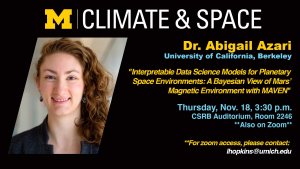Presented By: Climate and Space Sciences and Engineering
CLASP Seminar Series: Dr. Abigail Azari of the University of California, Berkeley

University of California, Berkeley Post Doctoral Researcher and Climate & Space alum Dr. Abigail Azari will give a lecture as part of the CLASP Seminar Series. Please join us!
Dr. Azari’s presentation is titled "Title: Interpretable Data Science Models for Planetary Space Environments: A Bayesian View of Mars’ Magnetic Environment with MAVEN" and will take place on Thursday, November 18 at 3:30 p.m. EDT.
This seminar will be in person at the Climate and Space Research Building Auditorium, Room 2246.
The seminar may also be viewed via Zoom.
Please contact lhopkins@umich to request zoom access.
ABSTRACT:
Recent planetary science missions are returning increasingly large datasets. The data volumes generated by modern missions have necessitated the use of data science methods, including machine learning to engage in data analysis. It is advantageous to use these data-intensive methods to study planetary systems as they provide new system-wide perspectives. However there are several challenges that create difficulties when engaging in the scientific process with currently available data and methods. First, planetary science data, much like other data from natural systems, is inherently spatio-temporal, of multiple resolutions, and contains uncertainty. This creates a barrier for data processing when using traditional machine learning methods. Second, many planetary science questions require the use of interpretable models to pursue inference. In other words, answering these questions requires models that follow some underlying physical rules or constraints, or otherwise simple functional form that allows for human understanding of the model’s form and outputs.
This presentation will provide an overview of these challenges and potential solutions, before discussing a recent application of Bayesian methods to quantify the spatio-temporal nature of Mars' magnetic field environment. The magnetic environment of Mars is understood to impact atmospheric loss processes, both at present data and over geologic timescales, but we are still understanding exactly how these magnetic fields affect such processes. Quantifying the magnetic field morphology is complex, as Mars’ magnetic field environment is driven by various factors. These factors include the non-uniform distribution of localized crustal fields, solar wind dynamics, and ionospheric currents. These result in spatially localized and global effects, driven by dynamic upstream conditions. Previous work has demonstrated crustal field influence on nightside dynamics [e.g. DiBraccio et al., 2018]. This presentation aims to develop a global perspective, where we are particularly interested in characterizing the magnetic field morphology on the dayside of the planet near the exobase where ions are cold, initially accelerated, and still controlled by the magnetic field. To do this, we take advantage of the extensive MAVEN magnetic field dataset which began orbiting Mars in 2014 and has now collected data from ~15,000 orbits that describe this magnetic environment over nearly the entire planet. We pursued Bayesian inference methods to estimate the effects of solar wind magnetic field direction on the resultant observations, before concluding on the implications for Mars' space environment.
Dr. Azari’s presentation is titled "Title: Interpretable Data Science Models for Planetary Space Environments: A Bayesian View of Mars’ Magnetic Environment with MAVEN" and will take place on Thursday, November 18 at 3:30 p.m. EDT.
This seminar will be in person at the Climate and Space Research Building Auditorium, Room 2246.
The seminar may also be viewed via Zoom.
Please contact lhopkins@umich to request zoom access.
ABSTRACT:
Recent planetary science missions are returning increasingly large datasets. The data volumes generated by modern missions have necessitated the use of data science methods, including machine learning to engage in data analysis. It is advantageous to use these data-intensive methods to study planetary systems as they provide new system-wide perspectives. However there are several challenges that create difficulties when engaging in the scientific process with currently available data and methods. First, planetary science data, much like other data from natural systems, is inherently spatio-temporal, of multiple resolutions, and contains uncertainty. This creates a barrier for data processing when using traditional machine learning methods. Second, many planetary science questions require the use of interpretable models to pursue inference. In other words, answering these questions requires models that follow some underlying physical rules or constraints, or otherwise simple functional form that allows for human understanding of the model’s form and outputs.
This presentation will provide an overview of these challenges and potential solutions, before discussing a recent application of Bayesian methods to quantify the spatio-temporal nature of Mars' magnetic field environment. The magnetic environment of Mars is understood to impact atmospheric loss processes, both at present data and over geologic timescales, but we are still understanding exactly how these magnetic fields affect such processes. Quantifying the magnetic field morphology is complex, as Mars’ magnetic field environment is driven by various factors. These factors include the non-uniform distribution of localized crustal fields, solar wind dynamics, and ionospheric currents. These result in spatially localized and global effects, driven by dynamic upstream conditions. Previous work has demonstrated crustal field influence on nightside dynamics [e.g. DiBraccio et al., 2018]. This presentation aims to develop a global perspective, where we are particularly interested in characterizing the magnetic field morphology on the dayside of the planet near the exobase where ions are cold, initially accelerated, and still controlled by the magnetic field. To do this, we take advantage of the extensive MAVEN magnetic field dataset which began orbiting Mars in 2014 and has now collected data from ~15,000 orbits that describe this magnetic environment over nearly the entire planet. We pursued Bayesian inference methods to estimate the effects of solar wind magnetic field direction on the resultant observations, before concluding on the implications for Mars' space environment.